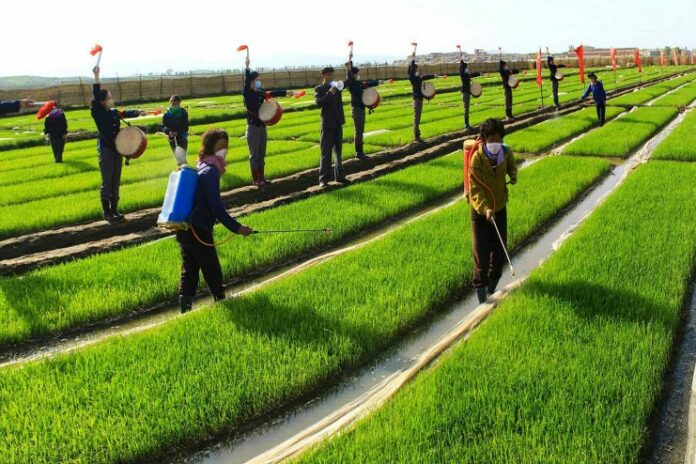
Facing a shortage of rice seedlings, members of a collective farm in Taechon County, North Pyongan Province, were recently arrested for stealing seedlings from a nearby farm.
A source in North Pyongan Province told Daily NK last Friday that a collective farm in the county was investigated by the Ministry of Social Security and Ministry of State Security after it was caught stealing seedlings from a nearby privately operated farm.
The farm was suffering woeful shortages of seedlings ahead of the impending rice transplanting season.
According to the source, privately run farms in Taechon received priority provision of farming supplies this year, so ordinary collective farms could not properly produce the seedlings their fields need. Moreover, vinyl wrapping is required to protect seedbeds, but many collective farms suffered severe shortages of vinyl wrapping. A lot of seedlings died because the farms could not maintain optimum temperatures.
Disgruntled farmers at the collective farm in Taechon County complained that privately run farms were receiving all the supplies, while they were struggling no matter how hard they worked. Thinking they had no choice but to steal supplies from privately run farms, the farmers began stealing vinyl sheeting little by little to protect their seedbeds.
This petty larceny proved insufficient, however, and in the end, the farmers could not save their seedlings. As the farm entered the planting period, farmers faced a severe shortage of seedlings to plant in their paddies as a result.
“Believing it had no choice but to steal rice seedlings from privately run farms that had plenty of them, the farm put together a scheme to steal the seedlings from a privately run farm in neighboring Unhung Village,” said the source. “They organized a squad of young people to begin the thefts, but they kept at it for too long and were ultimately caught.”
Working together, the county police and county branch of the Ministry of State Security arrested two working team heads and eight members of the team of young people for masterminding and taking part in the burglaries, placing them in a lockup run by the county police.
Already suffering from a labor shortage, the farm’s managers apologized desperately in hopes that the young people would be released, but the authorities warned them that the culprits would face stiff criminal punishments because “they ruined the farming at not only their own farm, but at their neighbor’s farm, too.”
The source said the county party committee and law enforcement agencies are threatening that, taking into consideration everything the culprits are accused of — stealing state property, violating quarantine protocols and even the “impure political intent” of harming privately run farms — life imprisonment would not be a strong enough punishment.
“Given that the accused could face life sentences, not just a slap on the wrist, their families are in anguish,” he added.
In a first-page article in the June 13 edition of Rodong Sinmun entitled “Results from the Strong Offensive in the Maximum Emergency Anti-epidemic Situation,” the newspaper reported that rice transplanting in major paddy fields had been completed nationwide by June 10. The article claimed that the successful completion of nationwide rice transplanting, “a very important farming process that determines the fate of the year’s farming,” guarantees that the nation will be able to achieve this year’s grain production goals.
Translated by David Black. Edited by Robert Lauler.
Please direct any comments or questions about this article to dailynkenglish@uni-media.net.

















